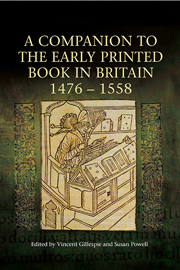Book contents
- Frontmatter
- Contents
- List of Illustrations
- List of Contributors
- Preface
- Acknowledgements
- Abbreviations
- Chronology of the Period
- Introduction
- I THE PRINTED BOOK TRADE
- II THE PRINTED BOOK AS ARTEFACT
- III PATRONS, PURCHASERS AND PRODUCTS
- 7 Merchants
- 8 The Laity
- 9 The Secular Clergy
- 10 The Regular Clergy
- 11 Universities, Colleges and Chantries
- IV THE CULTURAL CAPITAL OF PRINT
- Index of Manuscripts
- Index of Printed Books
- General Index
7 - Merchants
from III - PATRONS, PURCHASERS AND PRODUCTS
Published online by Cambridge University Press: 05 April 2014
- Frontmatter
- Contents
- List of Illustrations
- List of Contributors
- Preface
- Acknowledgements
- Abbreviations
- Chronology of the Period
- Introduction
- I THE PRINTED BOOK TRADE
- II THE PRINTED BOOK AS ARTEFACT
- III PATRONS, PURCHASERS AND PRODUCTS
- 7 Merchants
- 8 The Laity
- 9 The Secular Clergy
- 10 The Regular Clergy
- 11 Universities, Colleges and Chantries
- IV THE CULTURAL CAPITAL OF PRINT
- Index of Manuscripts
- Index of Printed Books
- General Index
Summary
It was a merchant, William Caxton, past-governor of the Merchant Adventurers of England in the Low Countries, who introduced printing in the English language to England, in the 1470s, operating first from Bruges and then from Westminster Sanctuary, free from the interference of the city of London where he belonged to the Mercers' Company. A merchant may be defined as a man who traded overseas, the only way to make serious profits; lesser men retailed and distributed goods in England. Caxton's mercantile expertise told him there was little point in competing in the saturated market of Latin or French books, except as a retailer of other printers' goods. The English language would not excite competition from overseas, English competitors would take time to establish themselves, and migrant, alien printers would always be at a disadvantage. He made a business decision to supply books in bulk to those who read English: ‘hit shold be a good besynes to translate hyt into oure Englissh to thende that hyt myght be had as well in the royame of Englond as in other landes’. As he found a shortage of English texts, he had to work on his own translations, drawing on the languages he had learnt in the cross-Channel trade (French and Dutch). His industry in translation was phenomenal and continued literally to the day he died.
- Type
- Chapter
- Information
- A Companion to the Early Printed Book in Britain, 1476-1558 , pp. 127 - 133Publisher: Boydell & BrewerPrint publication year: 2014

